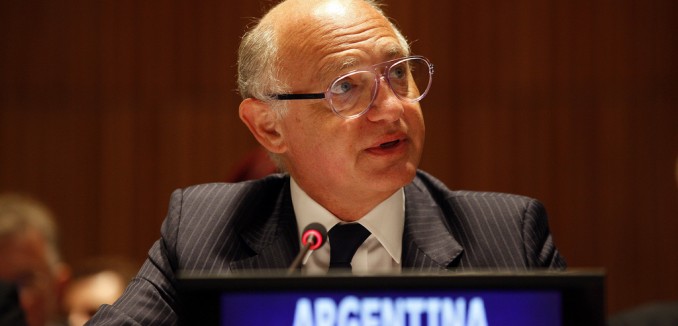In Argentina, the fallout from the probable murder of Special Investigator Alberto Nisman is rapidly turning into an ugly round of “accuse the Jews.” That turn of events was perhaps inevitable, given last week’s epic Twitter rant by Argentine President Cristina Fernández de Kirchner depicting Nisman as the local representative of a “global conspiracy” that is Jewish in all but name.
At the beginning of this week, Hector Timerman, the country’s Jewish foreign minister (and the son of the late dissident journalist Jacobo Timerman), furiously announced that he was resigning from both AMIA, the Jewish community center targeted by the 1994 bombing that Nisman was investigating, and the DAIA, the umbrella group that represents the Jewish community in political matters. Both organizations, Timerman charged, had engaged in “obstructionist actions” that had left him no alternative but to withdraw “from the DAIA the right to speak on my behalf.”
“[B]oth institutions continue hindering the investigation of the terrorist criminal [AMIA] attack which occurred on July 18, 1994, while at the same time they are feeding, maybe unintentionally, campaigns by those who are willing to use such a strategy for purposes which are contrary to the national interest,” Timerman concluded ominously. His resignation letter was also bitterly personal, speaking of an institution “that we were once proud of but now puts us to shame.”
The endorsement by a Jewish politician of Fernández de Kirchner’s slanderous accusation that Jewish communal organizations are trying to destabilize her government is a genuine gift for Argentina’s professional anti-Semites. They include individuals like Juan Gabriel Labaké, a Buenos Aires lawyer who has launched a private prosecution against AMIA and DAIA, alleging that both have engaged in treason. Labaké, an advocate of the conspiracy theory that Israel was behind the AMIA bombing, is basing his charges on Fernández de Kirchner’s remarks, which were in turn grounded on the original accusation by Jorge Elbaum, a former director of DAIA and a government loyalist, that AMIA, DAIA and Nisman’s supposed subversion was being financed by the American hedge fund billionaire Paul Singer, who has been locked in a separate legal battle with the Argentine authorities.
Just as anti-Zionist Jews provide a protective layer against charges of anti-Semitism directed at the BDS movement, men like Elbaum and Timerman perform much the same service on behalf of Fernández de Kirchner. Indeed, Timerman’s decision to openly turn on AMIA and DAIA brought forth an angry denunciation from Dr. Shimon Samuels, the international director of the Simon Wiesenthal Center. In an email to journalists, Samuels declared: “By this personal act, [Timerman] has rejected his Jewish education values and destiny – among them burial in a Jewish cemetery – and has, apparently, abandoned the Argentine victims of this Tehran-sponsored aggression,” a reference to the evidence uncovered by Nisman that Iran was behind the AMIA atrocity.
Encouragingly, Argentina’s Jewish leaders aren’t taking Timerman’s assault lying down. In a written reply to the foreign minister, AMIA secretary general Jorge Sobol and president Leonardo Jmelnitzky asserted, “We’ve taken notice of your letter in which you present your indeclinable resignation as member of the institution. We reject point blank the terms used in the letter, which we consider false, unfounded and slanderous towards AMIA and its leaders.”
Ironically, all these developments came during a week when Argentine legislators agreed on a bill that provides a one-time compensation payment to the families or estates of the 85 AMIA victims. Those who lost relatives will receive $170,000, with between 60 and 70 percent of that amount paid to those who were wounded. In part, the government was forced into supporting the measure because of a March decision by the Supreme Court ordering the state to pay compensation to the family of Ruth Faifman de Tenenbaum. Mrs. Tenenbaum, who lost her husband in the AMIA bombing, had been fighting the Argentine government in the courts for almost a decade. The decision in her favor allowed the court to underline, once again, Argentina’s failure to protect the AMIA building from a terrorist attack.
However, neither that acknowledgment nor the compensation will lead to any convictions in either the AMIA bombing or the Alberto Nisman case. When it comes to Nisman’s death, one of the most persuasive theories about the surrounding circumstances has just been advanced by Tower contributor Eamonn MacDonagh, who has written extensively on the AMIA case. Helpfully, his thoughts are available via Storify, and really should be read in full. Very basically, MacDonagh eloquently makes the case that the Argentine government was behind Nisman’s death, and that it was one of Nisman’s closest associates who carried out the murder.
[Photo: Control Arms / flickr]




